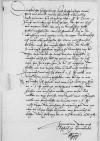Es ist 1541-12-04⌊gestrigs tags1541-12-04⌋ E(wer) F(urstlichen) D(urchlauch)t camerjunge von ⌊Crokaw⌋ ⌊hie⌋ durch geritten. / Der hat ein brief von unserm boten, / den wir an koniglichem hoffe haben, / nachgelassen, / von sich schreibende, / das er der abrichtung nach warten mus / derwegen, das ⌊konigliche m(aieste)t⌋, unser aller gnedigister her, etwan mit schwacheit beladen / nicht hat mugen horen lesen / die brieffe, so aus negst gehaltner ⌊tagfart⌋ zu ⌊Graudentz⌋ von ⌊ko(nigliche)n rethen dieser lande⌋, / die durch uns sein ufgeschickt, / in welchen etliche hendell des gemeinen nutzs, / die sich diese zeit zutragen, / sein ir ko(nigliche)n m(aieste)t angezeigt, / derhalben wir uns unsers boten so bald nicht vorsehenn / freuntlich und vleissig bittend, E(wer) F(urstliche) D(urchlauch)t wolde uns durch diesen unsern geschickten, / wie ko(niglich)e m(aieste)t in irer gesuntheit sich gehabe, / und was sonst neues von hove an E(wer) F(urstliche) D(urchlauch)t gelangt, / unbeschwert mitteilen, / desgleichen wir auch thun wollen, / wan unser bott widder an uns gereicht. / Was derselb wirt mitbringen, wolle wir freuntlicher vortrauter weis E(wer) F(urstlichen) D(urchlauch)t nicht bergen, / der gunstigen zuneigung gen uns, / wie wir die alweg bisher befunden, / uns freuntlich befolhen. /
⌊Ioannes⌋, von Gottes gnad bischoff zu ⌊Ermelandt⌋ /
ma(n)u p(ro)pria s(ub)sc(ri)p(simus)
 GStA PK, HBA, C1 No 868, 2 unnumbered
GStA PK, HBA, C1 No 868, 2 unnumbered  GStA PK, HBA, C1 No 868, 1 unnumbered
GStA PK, HBA, C1 No 868, 1 unnumbered 
